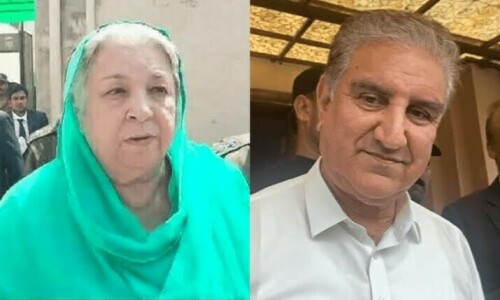JOHANNESBURG: The Earth Summit in Johannesburg had the ambitious target of drafting the architecture to save an ailing planet from the devastating effects of human exploitation. But after almost two weeks of negotiations millions of people all over the world are asking: So what was it worth?
Environmentalists and non-government organizations are almost universal in their stinging criticism of a “puff pastry” summit where negotiators spent hours arguing over procedural matters before agreeing to weak, non-committal and ambiguous language on many key issues of a 71-page draft Plan of Implementation.
Nevertheless, this largest ever United Nations conference, attended by more than 100 government leaders, and ten of thousands of delegates, NGOs and newsmen has stepped up the pressure on many governments and put the environment firmly back on the international agenda, according to experts.
“There is no turning back. Pressure is growing by the day on many governments to deliver and to do something about climate change,” says Gerd Leipold, head of Greenpeace International, in an analysis of the summit.
“To be honest, we didn’t expect much from the summit. But I am asking this question: What would we have had if the summit did not take place? It would have been a victory for the United States and others opposed to the multilateral process. It would have been a failure for the entire United Nations process,” Leipold argues.
Hearing the speeches of government leaders in the plenary of the UN conference, the bad conscience felt by some of the politicians was palpably visible.
French President Jacques Chirac turned on the rhetoric in an impressive speech, saying “the house is burning” and that mankind “at the forefront of evolution, has become the enemy of itself”.
German Chancellor Gerhard Schroeder interrupted his election campaign, flying to Johannesburg for a half-hour speech to tell the world that “climate change is no longer a sceptical forecast, but bitter reality” in referring to the recent devastating floods in his own country, China, Asia and America.
Many of the NGOs were asking a day later why the leaders did not put more pressure on their negotiators to work out a better deal. But British Prime Minister Tony Blair had cautioned from the start that not too much should be expected from conferences of this kind.
According to delegation sources, the negotiators spent hours arguing over procedural matters before actually turning to the nitty- gritty of text. One working group was close to a breakthrough when another working group sprung a surprise by tabling another much weaker text.
There were differences within the European Union on whether to include large dams in renewable energy, while the US and most of OPEC opposed all targets or percentages requiring reduction of fossil fuels — a crucial aspect in preventing global warming.
Petty “tribalistic thinking” and national interest predominated over the real issues that are of concern to the planet as a whole.
On the other hand, the Earth Summit gave the Kyoto Protocol on climate protection a major boost. Strong language was included in the draft plan calling on nations to ratify, after the US delegation had initially blocked off all mentioning of Kyoto. The treaty includes mechanisms on clean energy use that would rapidly play a much larger role globally once it takes effect. Several countries including Russia, China and Canada used the summit to announce ratification, making the implementation of the treaty virtually a certainty this year.
On the sidelines, the Earth Summit appeared to have some unexpected results. The World Bank, previously lambasted by activist groups on many issues, seems to have made a 180-degree turn. It joined forces with South Africa’s COSATU trade union federation calling for free elementary school education worldwide. It also joined developing countries against the rich nations in demanding a sharp reduction in trade distorting subsidies for fossil fuels and agriculture.
A new World Bank financing project seeking to slow down climate change while at the same time helping the poor was announced by the the lending agency. The carbon fund will allow first-world polluters to “offset” their greenhouse gas emissions by financing clean energy projects in developing countries.
Friends of the Earth and Greenpeace were clearly pleased that governments agreed on a text on corporate accountability and that there could be a development requiring transnational corporations to operate to best practice wherever they work.
This would have been impossible only a few months ago, according to NGOs and reflects ripple-effects from Enron and other recent corporate scandals. The NGOs had a field day in arguing: “How can you trust big business if they can’t even be held to stick to basic accountancy rules”.
Greenpeace shared a podium discussion with representatives of big business, with almost every speaker on the panel sharing the same view that something had to be done in practice because government bureaucracy was often too slow in acting.
Leipold of Greenpeace concedes that the activist organization has changed its tune in relations with big business. Greenpeace was no longer targeting business in general but looking at each company’s individual environmental record, thus making it a useful partner.
Over 6,000 NGOs were accredited to the Earth Summit, making it the ideal international platform for networking.—dpa













































Dear visitor, the comments section is undergoing an overhaul and will return soon.